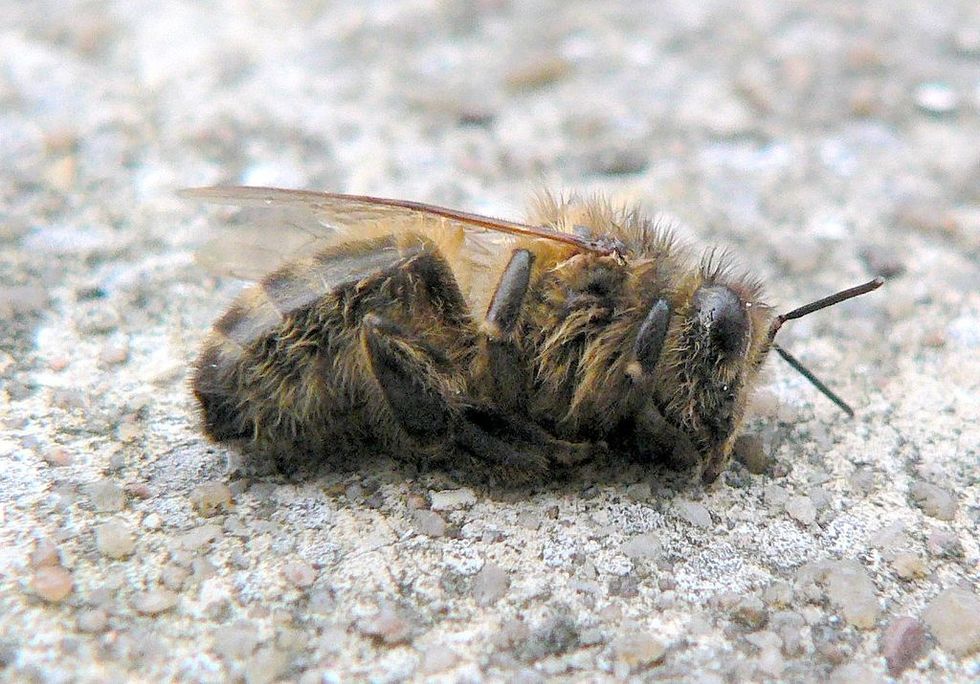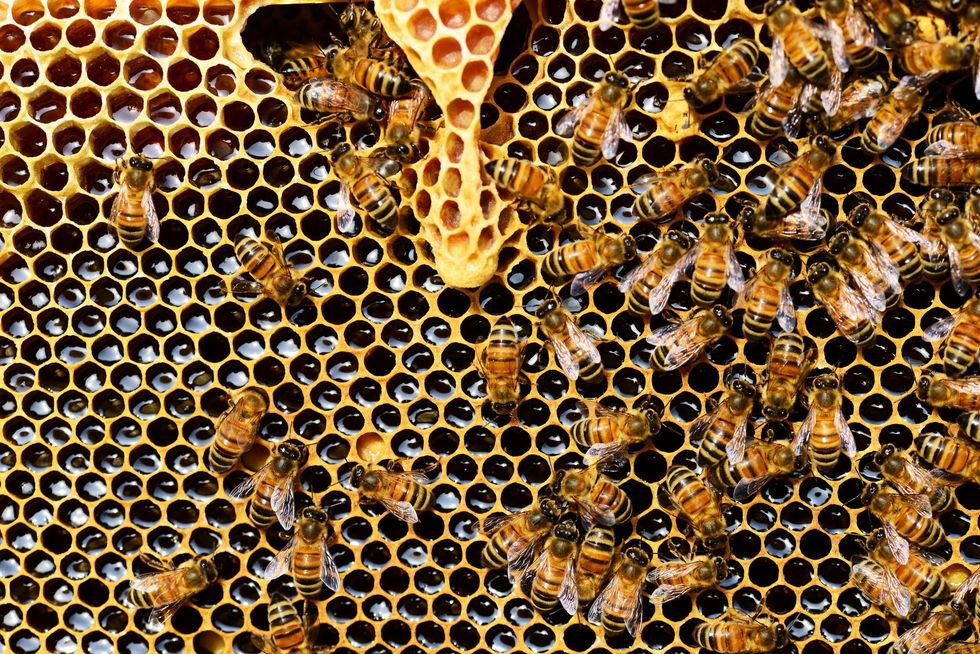What's Happening?
A decade ago, bee colonies flourished, inhabiting almost all regions of the US and creating some of the world's most beautiful gardens; however, today, they head toward extinction, with 37% of all bee species populations declining rapidly. In Iowa, harsh winters decimated almost 70% while California droughts drove almost 50% of honey producing colonies into dangerously low numbers. While diseases and climate change contribute to part of the problem, skyrocketing uses of pesticides and industrial chemicals have an even greater impact. The endorsement of such genetically modified methods only serves to weaken honey bee genetic defenses, leaving them vulnerable to parasites and defenseless to human intervention.
Honey bees prove vital to the wellbeing of human society as well as numerous ecosystems. Dependent on pollen, a nutritious food source that provides proteins, lipids and other vitamins, bees not only ensure future flower growth for plants but also contribute to the honey making process. Cross pollination, the transference of pollen from one flower to another, contributes to 75% of the production of fruits, nuts, berries and other flowers in the US. Other times, the pollination of wild flowers and a multitude of brush species enhances biodiversity while stabilizing the soil and Earth's landscape. Not only do bees benefit the ecosystem, they also contribute as a large financial asset, creating honey and aiding subsistence farmers. According to the American Beekeeping Foundation, honey bees contribute to over $15 billion in US crop production, translating to about $3200 per hectare of crop per year and bringing another wave of business to beekeeping industries around the globe. Thus, in the absence of bee activity, global production of food diminishes, ecosystem health fails, and both animals and humans suffer the same tragic fates.
Bees Are Dying.

The rampant use of agricultural chemicals prove disastrous to the environmental health of bees and their colonizing counterparts. Since 2013, the decline of Georgia's beehives have sparked concern among farmers. While beehive loss of 5-10% remained the norm, Georgia experienced a 30% decline, and according to reports cited in the New York Times, the heightened use of pesticides was the contributing factor. Neonicotinoids, a powerful new class of pesticides, were incorporated into plants themselves, often embedded in seeds so the plant itself carried the chemicals that kill preying insects. While these chemicals degrade within weeks, when bees carried contaminated pollen into hives, generations of bees become affected, leading to the notorious Colony Collapse Disorder.
Colony Collapse Disorder
This phenomenon, often known as CCD, occurs when a the number of worker bees die or disappear, leaving behind the queen. The intervention of industrial chemicals strangely leave very few bees near the colony and the hive initially remains abundant with honey and pollen reserves. However, hives cannot sustain themselves without certain worker bees, undermining the health of the entire honey bee ecosystem. Yet, dead bees don't necessarily mean CCD. Overexposure to pesticides results in acute pesticide poisoning that leaves bees dead at the entrance of the hive. Ultimately death in such large numbers results in the failure of successful hive communities and continues to plague the bee population of Georgia. Without the change, the continued use of pesticides and industrial chemical may very well drive bees to extinction.
Existing Regulation Is Inadequate.
In order to maintain the health of the plants and people , the process of obtaining all pesticides has become more restrictive due to the known damage they can do. Through the Georgia Pesticide Control Act, each pesticide has to be registered with the Commissioner of the Environmental Protection Agency (EPA) and have to be renewed every year. This system provides that the pesticides distributed can be tracked and restricted allowing the EPA to know what is affecting the environment. Another way they are managing these chemicals are through informing the communities about where they are used, especially near public buildings or communal spaces. The Georgia 1996 House Bill 1317 requires pesticide users to posts signs around public buildings when they are in the parameters of use. The place where pesticides are sprayed contributes directly to the large decline in the bee population due to the bees' involvement in the environment.
Although some pesticides can be beneficial to plants for survival in harsher conditions, they can negatively affect other plants, animals, humans, water streams, and aquatic life. Georgia Pesticide Use and Application Act of 1975 sets limitations on which pesticides are able to be used as well as what is put into each pesticide. This additional restriction allows for safer chemical treatments to be filtered more closely allowing fewer to be in circulation. EPA then enforced the Federal Insecticide, Fungicide, and Rodenticide Act (FIFRA) which acknowledged that out of 600 ingredients of pesticide, they have identified 185 that do not meet the standards of safety. Although these ingredient restrictions do help the environment, the overarching problem deals more with where they are affecting the largest amount of animals residing in deaths.
PEN-G Student Project Proposal:
To prevent the trend of decreasing bee populations, the Pesticide Elimination Network— Georgia (PEN-G) policy should be adopted to Georgia's industrial and agricultural complexes. This act calls for the banning of the most harmful neurotoxic pesticide: Neonicotinoids. Responsible for the massive increase of physiological problems among bee population, this chemical must be banned from regular agricultural use, including but not limited to usage in fertilizers, leading to an all phase out movement. While the elimination may bring critics to their feet in protest, a simple, ancestral technique can be used as a Neonicotinoid alternative: crop rotation. This method of farming prevents the same crop from being planted for over an interval of time, which thus decreases plant susceptibility to diseases and other parasites. Furthermore, a comprehensive list of other ubiquitous chemicals can be used in the place of Neonicotinoids, even though studies by the Greenpeace Organization in Europe claim that no economic loss was experienced with the removal of this chemical.
Adopt-A-Hive!
Not only can corporations take action, PEN-G also works toward bee conservation. An 'Adopt-a-Hive' program allows people to invest in a hive, taken care by local beekeeping organizations. Once these hives have matured, the bees can be transported to certain farms to increase pollination. Education conferences and resources will be offered to educate people about the harms of such chemicals and delineate the successful alternatives farmers can use to benefit the health of not only their farms but also the ecosystem around it. Citizens can also take direct action themselves. By turning to organic produce, planting nectar/pollen rich flowers, and providing easy bee nesting places in their own backwards, people can further the progress of honey bee conservation. PEN-G thus serves to involve government, corporation, and people together to create a healthy, flourishing environment that yields the greatest economic benefits while endorsing healthy Earth habits.
Get To The Root Of The Problem!
Finally, in order to eliminate the gradual decrease of the bee species, people need to go to the root of the problem: location. Researchers need to transition from specific pesticide ingredient analysis to a broader scope of where the safest places are to spray chemicals. PEN-G strives to prevent such toxic chemicals from running into nearby streams or polluting underwater reservoirs. Additionally, striking pesticide use depending on location ensures the health of other organisms that live in the same farm land, which prompts more research on what flowers bees pollinate and where beehives are located. With this knowledge, policy makers can set limitations for pesticide use so compliant users know the effects that can occur if chemicals are sprayed in certain areas. So, with the implementation of PEN-G into Georgia industrial regulations, we can progress further in our efforts to save the bee population from its sharp descent toward extinction, one step at a time.




















